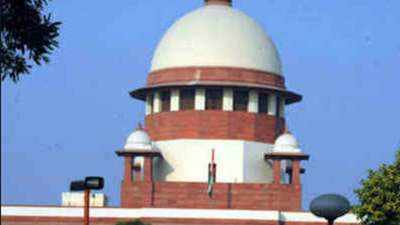- News
- Business News
- India Business News
- SC allows cryptocurrency trading, cancels RBI's 2018 circular
Trending
This story is from March 4, 2020
SC allows cryptocurrency trading, cancels RBI's 2018 circular
The SC on Wednesday allowed a plea challenging the RBI's 2018 circular which barred banks from trading in cryptocurrencies. "Trading in cryptocurrencies now will be allowed," the top court noted. In April 2018, the RBI had issued a circular barring banking and financial services from dealing in virtual currency.

(File photo)
NEW DELHI: The Supreme Court on Wednesday allowed a plea challenging the Reserve Bank of India’s (RBI's) 2018 circular which barred banks from trading in cryptocurrencies.
"Trading in cryptocurrencies now will be allowed," the top court noted.
In April 2018, the RBI had issued a circular barring banking and financial services from dealing in virtual currency or cryptocurrency such as Bitcoin, most valued cryptocurrency in the world.
The RBI had stated that virtual currencies (VCs) (cryptocurrencies and crypto assets) "raise concerns of consumer protection, market integrity and money laundering." In view of the associated risks, banks were asked not to deal with crypto-related businesses.
This circular was challenged by an industry group Internet and Mobile Association of India (IMAI) before the SC.
"Investments had stopped and start-ups were staying away from starting business in the crypto and blockchain space in India which will change now that the Supreme Court has said that the RBI circular was unconstitutional," Nischal Shetty, CEO of WazirX, an Indian cryptocurrency exchange, tld news agency Reuters.
However, the industry still faces hurdles as a government panel, appointed to look into the matter, has recommended that India ought to ban all private cryptocurrencies. In July, the panel also recommended a jail term of up to 10 years and heavy fines for anyone dealing in digital currencies.
The government though is yet to act on these recommendations and is yet to finalse regulations around cryptocurrencies.
On several occasions, the government along with the central bank, had cautioned the public about the risks of cryptocurrencies. If the government follows the panel's recommendations, it could signal the end of the road for these digital currencies in India.
(With Reuters inputs)
"Trading in cryptocurrencies now will be allowed," the top court noted.
In April 2018, the RBI had issued a circular barring banking and financial services from dealing in virtual currency or cryptocurrency such as Bitcoin, most valued cryptocurrency in the world.
Cryptocurrencies are digital currencies in which encryption techniques are used to regulate the generation of currency units and verify the transfer of funds, operating independently of a central bank.
The RBI had stated that virtual currencies (VCs) (cryptocurrencies and crypto assets) "raise concerns of consumer protection, market integrity and money laundering." In view of the associated risks, banks were asked not to deal with crypto-related businesses.
This circular was challenged by an industry group Internet and Mobile Association of India (IMAI) before the SC.
"Investments had stopped and start-ups were staying away from starting business in the crypto and blockchain space in India which will change now that the Supreme Court has said that the RBI circular was unconstitutional," Nischal Shetty, CEO of WazirX, an Indian cryptocurrency exchange, tld news agency Reuters.
However, the industry still faces hurdles as a government panel, appointed to look into the matter, has recommended that India ought to ban all private cryptocurrencies. In July, the panel also recommended a jail term of up to 10 years and heavy fines for anyone dealing in digital currencies.
The government though is yet to act on these recommendations and is yet to finalse regulations around cryptocurrencies.
On several occasions, the government along with the central bank, had cautioned the public about the risks of cryptocurrencies. If the government follows the panel's recommendations, it could signal the end of the road for these digital currencies in India.
(With Reuters inputs)
End of Article
FOLLOW US ON SOCIAL MEDIA















